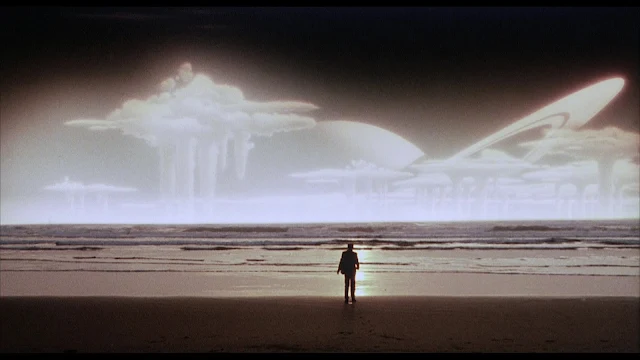The film is based on a 1981 science fiction novel by New Zealand writer Craig Harrison.
The narrative follows the story of Zac Hobson, a scientist who awakens to find himself seemingly the last person on Earth following a mysterious experiment that goes awry. As Zac navigates the eeriness of an empty world, the film delves into several thematic layers that resonate with the viewer on both a personal and philosophical level.
Isolation and Loneliness
At its core, "The Quiet Earth" is a stark exploration of isolation. The film meticulously portrays Zac's psychological journey as he grapples with the overwhelming loneliness of being the sole survivor in a silent world.
This theme is not only literal, in terms of the absence of other human beings, but also metaphorical, reflecting the isolation one can feel even in a populated world.
Zac's initial response to his solitude ranges from the euphoria of unchecked freedom to the depths of despair, highlighting the human need for connection and the psychological toll of its absence.
Human Connection and the Search for Others
As the narrative unfolds, Zac's discovery of other survivors introduces a new dynamic and shifts the thematic focus towards human connection.
The film examines the intrinsic human desire to find others with whom to share experiences, fears, and hopes. The interactions between the characters serve as a microcosm for societal connections at large, exploring themes of cooperation, conflict, and the complexities of forming relationships under extraordinary circumstances.
This shift underscores the notion that even in the most desolate conditions, the search for understanding and companionship is fundamental to the human condition.
The Significance of 6:12
One of the most intriguing elements of "The Quiet Earth" is the recurring motif of clocks and watches stopping at 6:12, which serves as a symbolic reference to the Bible's Book of Revelation and introduces an eschatological dimension to the film's narrative.The specific moment when time stops at 6:12 is a deliberate choice by the filmmakers, linking the earthly, scientific realm of the story with the spiritual and prophetic. The Book of Revelation, often associated with the end times and the apocalypse, is a rich source of imagery and themes concerning the ultimate fate of the world and humanity's place within it.
Revelation 6:1 speaks of a great earthquake, the sun turning black, and the moon becoming like blood, among other cataclysmic visions. This scripture is part of the opening of the sixth seal, which in Christian eschatology, signifies the approach of the end times. The thematic connection in "The Quiet Earth" suggests that the catastrophic event leading to the apparent disappearance of humanity can be seen as a form of apocalypse, one possibly brought on by human hubris and the reckless pursuit of scientific advancement without due consideration of the potential consequences.
This thematic linkage serves multiple purposes within the narrative. It not only heightens the sense of mystery and foreboding surrounding the events but also prompts a reflection on the moral and ethical dimensions of human endeavors, particularly in the realms of science and technology. The use of a specific biblical reference enriches the film's exploration of existential themes, offering a layered reading that incorporates spiritual and metaphysical questions into a story fundamentally concerned with the human condition.
The Consequences of Human Hubris
"The Quiet Earth" also offers a critical view of scientific ambition and human hubris. The catastrophe that renders Earth quiet is the result of a scientific experiment gone wrong, a narrative choice that prompts reflection on the ethical implications of scientific advancement and humanity's role in its own potential destruction.
Zac, as a scientist partially responsible for the experiment, embodies the moral conflict and guilt associated with the consequences of human innovation.
This theme encourages viewers to contemplate the fine line between progress and recklessness, questioning the limits of human ambition and the responsibility that comes with power.
Existentialism and the Search for Meaning
Finally, the film delves into existential questions about the meaning and purpose of life in the face of unimaginable change. Zac's journey is not just a physical search for other survivors; it is also a metaphorical search for meaning in a world that has been stripped of its familiar structures and norms.The film challenges the viewer to consider what gives life value when traditional societal anchors are gone. Through Zac's experience, "The Quiet Earth" explores the human capacity to find or create meaning in the absence of external validation, suggesting that hope, resilience, and the search for purpose are intrinsic parts of the human experience.
In conclusion, "The Quiet Earth" is a multifaceted film that engages with themes of isolation, human connection, the consequences of human ambition, and the existential search for meaning. Through its compelling narrative and complex character dynamics, it invites viewers to reflect on the essence of human nature and the fundamental aspects of our existence. The film's exploration of these themes ensures its relevance and resonance with audiences, making it a timeless piece of science fiction cinema that provokes contemplation and discussion.
If you liked this film you may like the film Z for Zachariah
















